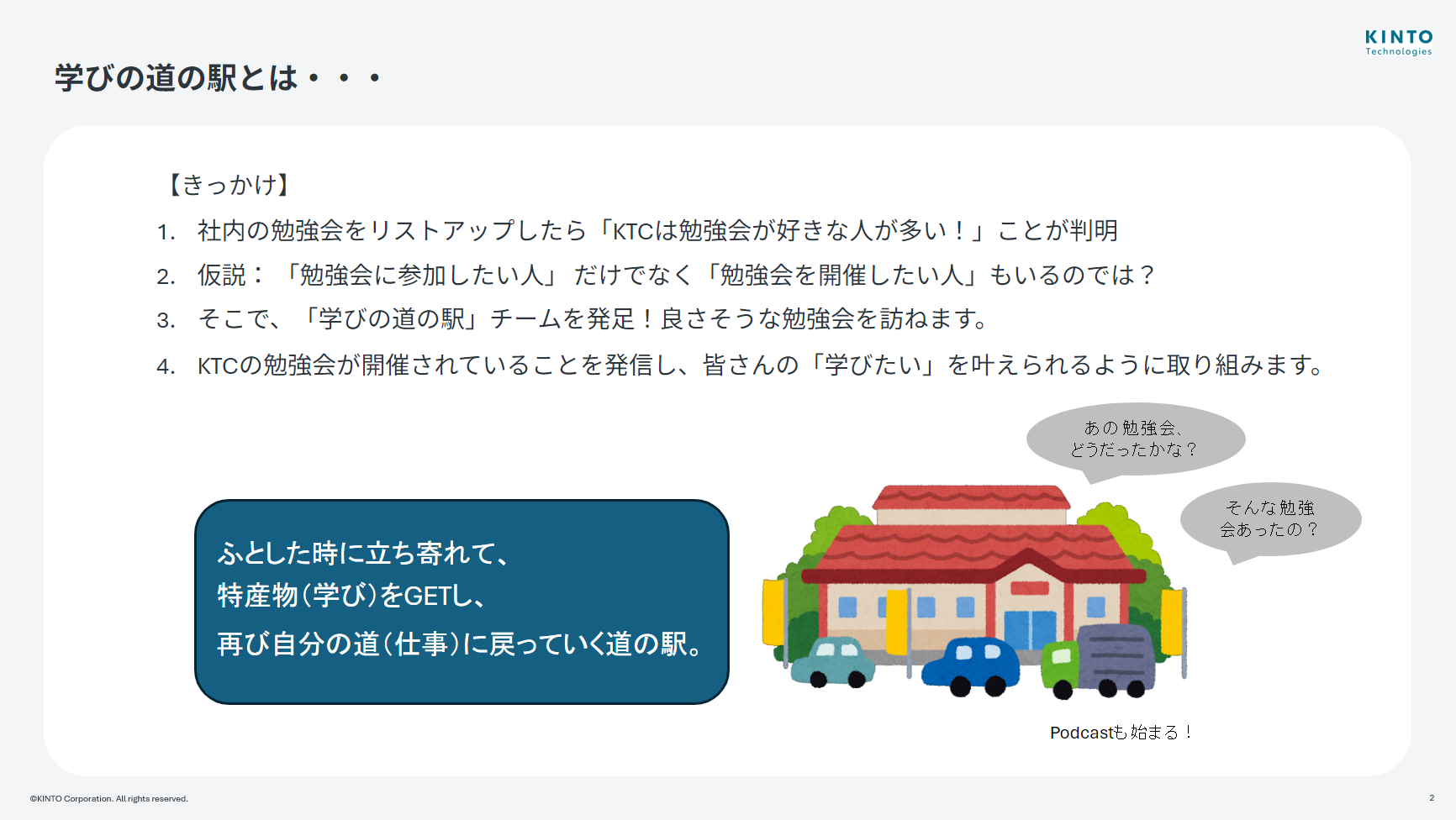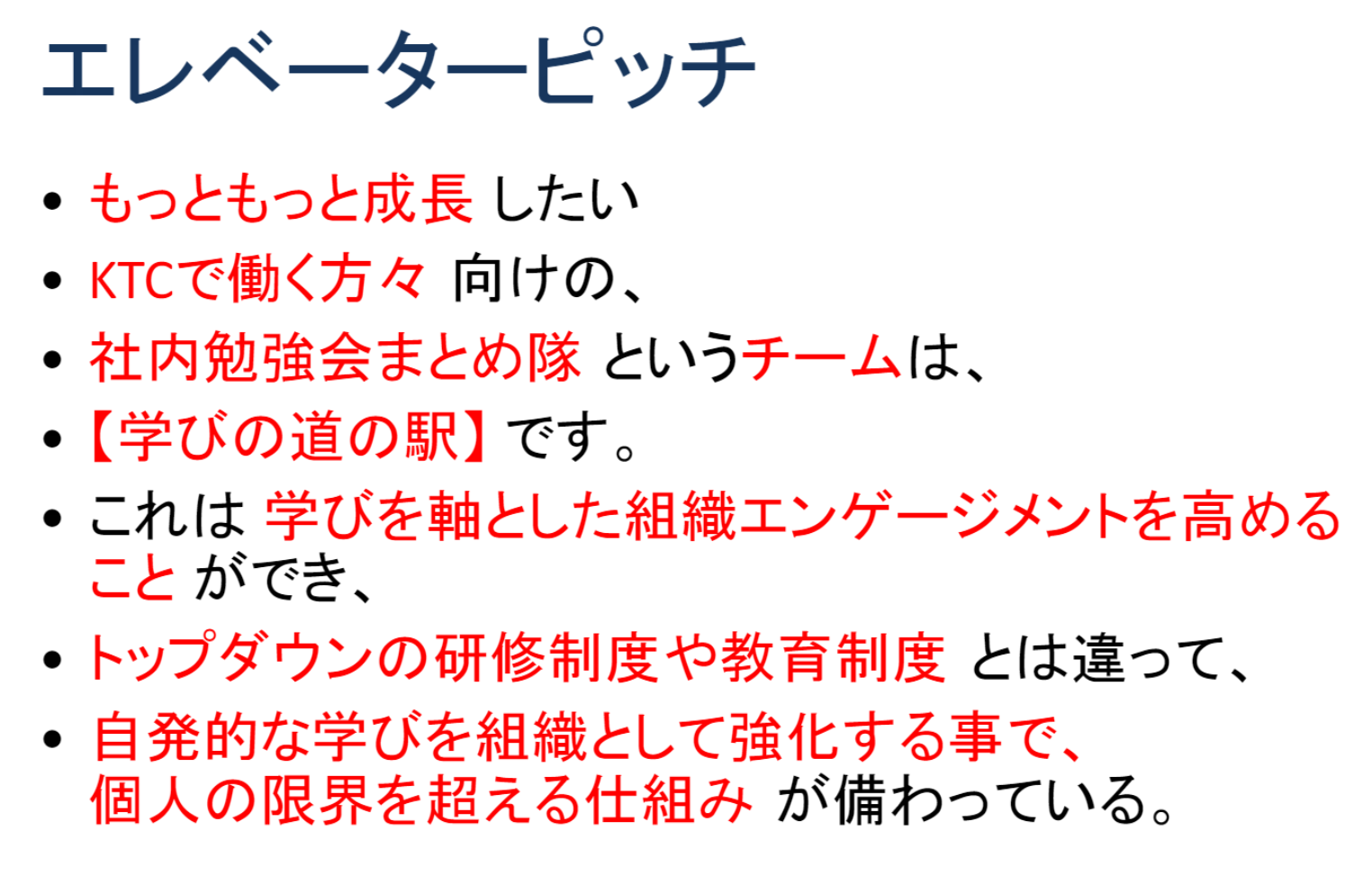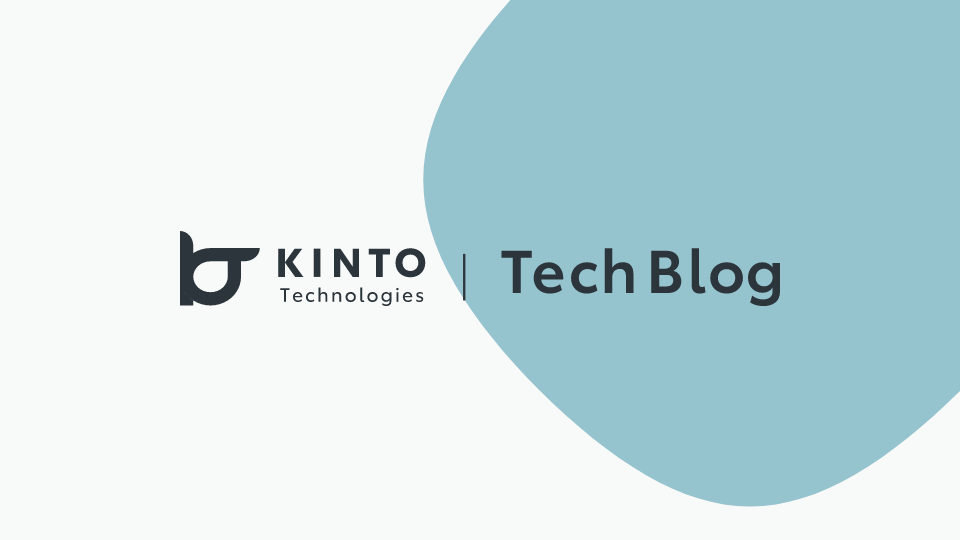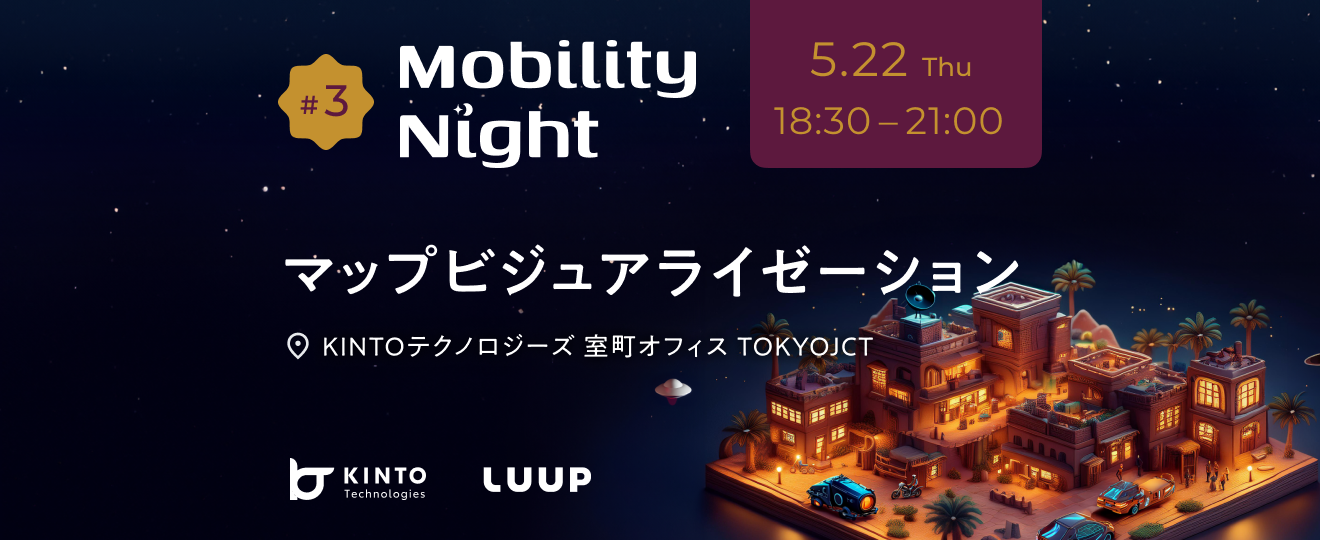【学びの道の駅】はじめました!

はじめに(活動の概要紹介)
KINTOテクノロジーズで「学びの道の駅」という取り組みが始まりました!
「学び」+「道の駅」ってどういうことでしょうか?当社ではアウトプットカルチャーを推進しており、その活動として、テックブログやイベント登壇など様々な取り組みを行っております。
では、アウトプットの推進力となるのは何でしょうか?
アウトプットの前提としての「インプット」つまり「学習した内容」というのがとても重要になると私たちは考えています。社内の学習する力を強化していく、そんなチームが立ち上がりました。今回のプロジェクトも有志で集まって活動が始まっています。
「道の駅」という言葉にもいろいろな想いが込められています。みなさんは道の駅を利用したことがありますでしょうか?道の駅は様々な地方の特産物が集まるコミュニティであり、旅人が身体を休ませる場所であり、他では出会うことが出来ない様々な未知の世界に遭遇できる素敵な「居場所」だと私たちは考えています。
そこで「学び」という旅を続けるみんなが気軽に立ち寄って、新しい出会いに心ときめくそんな、みんなが集まって元気をもらえるような居場所を作る「道の駅」を作り出したいという想いから「学びの道の駅」が誕生しました。
「学びの道の駅」は何をやるのか?
社内の「勉強会」と「勉強会」が交わる「道の駅」として、勉強会を軸にした社内活性を支援します。
- 社内広報活動
- 今度、こういうテーマで勉強会やるよ!
- 気になるあの勉強会、どんな感じなんだろう?
- 勉強会の支援
- 勉強会を始めてみたいけど、どうやって始めると良いのか?
- 勉強会の運営しているけど、盛り上がらない…
- などの、お悩み相談
【運営メンバーに聞いてみた】どんな想いから「学びの道の駅」にたどり着きましたか?
中西: 私は「人生=学び」だと日々考えています。人は常に新たなことを学ぶことで生きがいを見つけたり、心の拠り所を見つけたり、人生に活力を与えてくれます。いままで出会って素敵だなと魅力的に感じる方は皆さん常に新たなことを学び続けている方でキラキラと輝いていました。会社全体にキラキラと輝く人たちが集う場所が作れたら毎日の仕事でもより良いものづくりができるようになると思っていた中で、「社内の勉強会の情報が散らばっている」「どんな学びの環境があるか知りたい」という声が社内から届くようになり、今回のプロジェクト立ち上げに繋がりました。
HOKA: 私は普段は人事の仕事をしているので、従業員の皆さんと面談している中で「もっとグループ間を越えたコミュニケーションがしたい」という声をいただき、漠然と「何とかしたいな」という気持ちを持っていました。同時に、業務を通して「KINTOテクノロジーズで活躍している人は勉強会に参加しているな」と気づくことがありました。この2点が交差して「学びながら交流できる仕組みが必要?!」というアイデアが生まれを上司に相談したところ、きんちゃんと中西さんを紹介され、「学びの道の駅」が文字通り爆誕しました。
きんちゃん: 私は15年以上前から様々な場面で「勉強会」の文化に触れてきました。KINTOテクノロジーズは、私が入社したときから既に「学びが仕事に溶け込んでいる」とても良い文化を持っていました。この良い文化をもっともっと拡げ、人と組織と事業の成長に貢献したい!という想いから、「勉強会の情報を集める」行動に関わっていく事となりました。
成り立ち
【成り立ち1】社内の勉強会の情報をまとめたい!
KINTOテクノロジーズは、「勉強会、輪読会」といった「社員が有志で学ぶ活動」が活発な組織です。
社内で色々な勉強会が行われているけど、「どこで?」「いつ?」行われているのかが分からない!知りたい!もっと学びたい!という声を色々耳にする機会があり、それを見える化したいね!という想いが、私たちの活動の原点になります。
ということで、早速、情報収集をしてみると短期間で40件ほど勉強会が存在することが分かりました。他にも隠れ勉強会の存在を把握しているので、小規模なものも含めておそらく60以上の勉強会が社内で行われているのでは無いかと推測しています。
そこで、「こんなに勉強会が活発なのってすごくない?」と思った3人が集い、話し始めたのが2023年の11月末。
【成り立ち2】何をやろう!?
まず、最初のミーティングでは、やりたい事を列挙していきました。勉強会を片っ端から突撃してみる?テックブログでどんどん発信する?等のアイデアが出たものの、まずは私たちのことを社内で知ってもらうことが重要では?という仮説に至りました。
そこで、私たちは3週間後の12/21に開催される社内LT大会に参加することにしました。まだ「学びの道の駅」には触れず、3人それぞれがLTに登壇し、きんちゃんは見事優勝(パチパチ)。まずは社内の人に自分たちを知ってもらうという行動を起こしました。
※詳しくはLT大会のテックブログをご参照ください↓↓
【成り立ち3】インセプションデッキを作ろう!
2023年12月27日に行われたMTGでは、「やりたいことがたくさんある私たちには指針が必要」ということに気づきました。そこで、年明けから「インセプションデッキ」を作成することにしました。インセプションデッキとは、ソフトウェア開発プロジェクトにおいて、メンバー全員がプロジェクトの開発に共通認識と目標を持って取り組むために作成されます。私たちは下記4項を明文化しました。
- 我々はなぜここにいるのか
- エレベーターピッチ
- やらないことリスト
- 俺たちのAチーム

明文化したことにより、「学びの道の駅」というプロジェクト名も自然にイメージが沸いて来て、迷わず決めることができました。
インセプションデッキを作る途中、協調学習の話や、ソース原理の話を交え、私たちはそれぞれ「学び」への想いを語らいました。インセプションデッキを作る工程自体も、私たちにとっての学びになっている、と感じた瞬間でした。
ついにエンジン始動!!
インセプションデッキが出来上がったのが2024年1月後半。出来上がった時、私たちは少し焦っていました。なぜならば、インセプションデッキを作ったことで、やりたいこと・やるべきことが明確になり、一刻も早く動き出したかったからです。(インセプションデッキの提案者であるきんちゃんは「しめしめ、予想通りだ」とこっそり喜んでいたとかいないとか)
動き出す第一歩として月次で開催されているKINTOテクノロジーズ全メンバーが集まる「部会」で、私たち「学びの道の駅」が誕生したことを発表しました!

それと同時に、「突撃!となりの勉強会」も開始していました。
2月22日に合同勉強会を運営されている皆さんに会議室に集まって頂きインタビューをしたのです。事前に企画書やインタビュー項目も作らず、スマホを出してその場で録音。インタビューする側もされる側も「え?この場で?!」という若干の戸惑いはありながらも、協力してくれました。(みなさんありがとう!)
後日、Podcastとして流せるよう不要コメントをカットし、無事に3月13日には全社Slackで全従業員にお披露目することができました。

今後について
その後、私たちは3つの勉強会に突撃し、Podcastを2本公開し、Blogを2本取り掛かりながら、改めて振り返りと自分たちの今後について話しました
- 皆が知りたいことは何?
- 勉強会そのものに興味があるのか?
- 運営している側は、何を知ってもらいたいか?
などを話し合った結果、「勉強会により、目的やニーズはそれぞれ違う。それぞれの個性に合わせたストーリーを個別に組み立てる方が良い」という結論に至りました。
また、
- Podcastはなんの役割?
- 勉強会の広告宣伝としてのコンテンツ?
- 社内報としてのコンテンツ?
といった点についても検討した結果、「こんなにもたくさんの勉強会をやっていることがKTCの日常」、すなわち「勉強会文化が根付いていることを見える化できれば目的達成なのでは」という結論に至りました。今後については、勉強会に突撃しながらPodcastを作り、失敗があれば学び、伸ばすところは伸ばす、という活動方針で進める事にしました!
実は、この「動きながら、ふりかえり、軌道修正して、より良い方向へ進んでいく」というアジャイルな進め方に一人、冷や汗をかいているHOKAがいました。KTCに入社するまで情報の取り扱いにはルールやフローが決まっている会社で働いていたからです。
「学びの道の駅」の事務局として活動することにより、人事でありながらKTCの開発方針「小さく作って大きく育てる」を学ぶ機会となっています。
「学びの道の駅」は始まったばかり。これからも時々、KINTOテックブログに登場する予定ですので、どうぞよろしくお願いいたします。
関連記事 | Related Posts

Reflecting on the First Year of Manabi-no-Michi-no-Eki: The Roadside Station of Learning
![Cover Image for [Learning Roadside Station Podcast] Introducing a New In-House Study Initiative: The Joint Study Group](/assets/blog/authors/aoi.nakanishi/2024-12-podcast/study-group.jpg)
[Learning Roadside Station Podcast] Introducing a New In-House Study Initiative: The Joint Study Group

Learning Roadside Station: We Popped into the iOS Team's Study Session
![Cover Image for [Manabi-no-Michi-no-Eki] We Turned Internal Study Session Videos into a Platform and Made Them Viewable All in One Place](/assets/common/thumbnail_default_×2.png)
[Manabi-no-Michi-no-Eki] We Turned Internal Study Session Videos into a Platform and Made Them Viewable All in One Place
![Cover Image for [Learning Roadside Station Podcast] KINTO Factory Automotive Study Session](/assets/blog/authors/aoi.nakanishi/2024-12-podcast/factory.jpg)
[Learning Roadside Station Podcast] KINTO Factory Automotive Study Session
![Cover Image for [Manabi-no-Michi-no-Eki (Roadside Station of Learning)]: We have started in-house podcasting.](/assets/common/thumbnail_default_×2.png)
[Manabi-no-Michi-no-Eki (Roadside Station of Learning)]: We have started in-house podcasting.
We are hiring!
生成AIエンジニア/AIファーストG/東京・名古屋・大阪・福岡
AIファーストGについて生成AIの活用を通じて、KINTO及びKINTOテクノロジーズへ事業貢献することをミッションに2024年1月に新設されたプロジェクトチームです。生成AI技術は生まれて日が浅く、その技術を業務活用する仕事には定説がありません。
【部長・部長候補】/プラットフォーム開発部/東京
プラットフォーム開発部 について共通サービス開発GWebサービスやモバイルアプリの開発において、必要となる共通機能=会員プラットフォームや決済プラットフォームの開発を手がけるグループです。KINTOの名前が付くサービスやTFS関連のサービスをひとつのアカウントで利用できるよう、様々な共通機能を構築することを目的としています。

